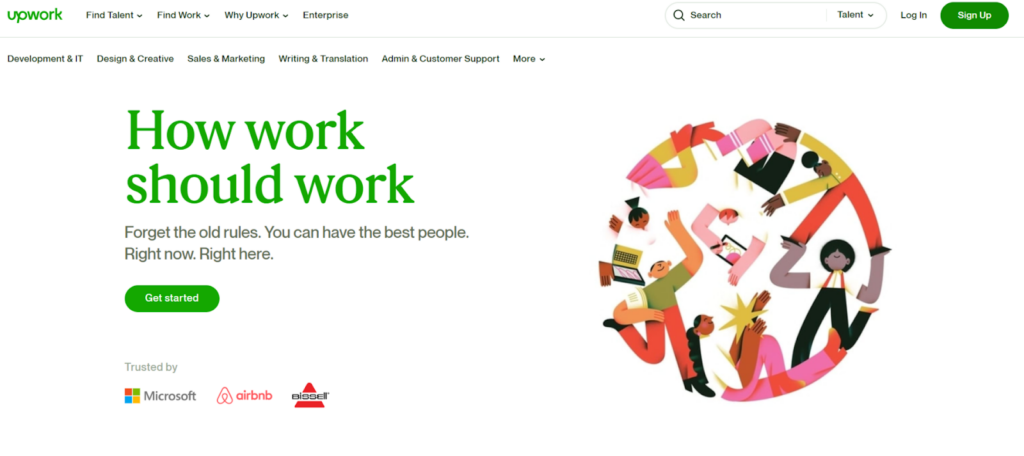If you’re starting out as a freelancer, you’re probably wondering if Upwork is legit, safe AND a good place to set up shop. After all, it’s consistently touted as one of the best freelancer platforms around.
Indeed, Upwork has been around since 2013, making it one of the oldest freelancing platforms available. And it certainly has established market dominance in that time, with millions of freelancers vying for the attention of over 750,000 clients.
But is Upwork going to make your freelancing dreams come true? Is upwork reliable? Or is it a platform best left alone?
Here’s what you should know about Upwork in 2025.
TL;DR: Upwork is safe and legit, but there are scammers operating on the platform. Therefore, you must follow its safety guidelines and refuse a job if something seems “off.” Upwork also charges a lot to use its platform, and while this is perfectly legit, many people feel it is “scammy” behavior.
Is Upwork a Legit Freelance Hiring Platform?

So, is Upwork a legit site? Upwork is 100% a legit platform and, within two decades, has become the leading platform for finding freelancers.
Upwork is trusted by leading global brands such as Microsoft, Airbnb, and Bissell and consistently receives good reviews across all platforms, including Glassdoor, TrustPilot, and Indeed.
But, while Upwork is a fully legit website, the people who use it are sometimes not. In other words, despite having a fairly decent vetting process and safety measures in place, Upwork cannot guarantee that you won’t encounter the odd scammer here and there.
Additionally, Upwork has been increasingly thrown into the spotlight for how much it charges freelancers to use the platform, and this often throws up the question of whether or not the platform is a scam.
Why Upwork Could be Considered a Scam

Okay, so every job posting site in existence needs to monetize itself in some way or another. In most circumstances, you either pay a subscription fee to use the site, or the site takes a cut of your earnings.
Upwork takes a cut of what each freelancer earns. For new users, this is a whopping 20% but drops down to 5% after you’ve earned over $10,000.
Not only that, but Upwork has something called “Connects.” This is the platform’s virtual currency that you use to bid on jobs to increase your chances of being seen.
You get a number of free Connects each month, but these are limited and don’t last long especially considering you need to bid up to six Connects per job listing. You can purchase further Connects at $0.15 each or buy bundles of them.
You don’t have to use Connects to bid for jobs, but your application will soon drop to the bottom of the pile as each job posting on Upwork has tonnes of applicants.
Keep in mind that even if you use connects to bid for a job, it doesn’t guarantee you will get the job or that you’ll even get a response. Success on Upwork typically requires multiple job applications a day which can soon add up if you’re using Connects each time.
Ultimately, not only do you have to pay to apply for each job on Upwork (to stand a chance), but you also have to give a cut of your earnings to the platform. And this is before you’ve even paid your taxes!
So you can see that while Upwork is a legit platform, many people feel that its practices are unfair.
Is Upwork Safe to Use?

Upwork is safe to use as long as you follow its user guidelines. The platform takes security seriously and offers resources about how you can stay safe while using its platform.
While Upwork itself is safe, the people that use it may not be, and unfortunately, the platform has its fair share of scammers waiting for their chance to take advantage.
These scammers operate in a number of ways:
- Fake jobs will be posted with the objective of stealing your personal data. They do this by claiming they require certain information from you before they will consider you for the role
- Real jobs will be posted, but the scammer will disappear once you have completed the work, and you’ll be left without payment
- Scammers can also convince you that you need to purchase something before you can do the job for them (software or training course, for example)
- Lastly, a scammer can send you a link for a job or piece of work that contains a malicious link
How to Avoid Being Scammed on Upwork

You can avoid scams on Upwork by ensuring you stick to and follow these tips:
- Research a client before applying for a role. This can be done either via their Upwork profile (read the reviews), or you can search for the company online
- Never provide any of your personal information, no matter how relevant it may seem for the role.
- Do not click on any links sent by the client. They should instead provide document attachments that detail the job.
- Never ever move anything outside of the Upwork platform. This includes the delivery of any work and receiving payments. If a client tries to do this, you must report them to Upwork.
- Do not pay for anything in order to complete the job. If the client is legit, they will provide all resources and training materials for free.
- Never create or provide free samples of work. If a client requests this, they are likely doing it to multiple other freelancers and getting a tonne of work for free.
- Avoid “pay to work” opportunities at all costs. In no world should you ever have to pay to do a job.
Is Upwork Worth It?

If you are new to the platform, Upwork is notoriously difficult to gain a foothold on. The competition is fierce, and most clients favor established users who have many reviews on their profiles. It’s not uncommon for you to apply for 50+ jobs before getting a reply or an interview.
Additionally, Upwork is not the place where your work is valued highly. Thanks again to the sheer number of competing freelancers, people frequently drop their rates to stand a better chance of being selected. Therefore, it becomes a race to the bottom, and clients come to expect a bargain.
If you’re determined, Upwork can be lucrative, but you need to be prepared to put in a lot of grunt work to get there. Additionally, you’ll likely have to charge less than you want or take up badly paid gigs until you’ve got a few reviews under your belt.
Upwork Alternatives to Consider
Upwork isn’t the only platform out there for freelancers. And as it becomes harder and more expensive to establish yourself there, other websites are gaining in popularity.
If you feel that Upwork isn’t the best option for you, check out the following:
- Fiverr: If you don’t want to hustle to get jobs, Fiverr is for you. Post your services and let customers find you. You can charge what you like, but Fiverr will take 20%.
- Toptal: If you’re very experienced in your field of work, then Toptal is a great choice. Because it is specifically for top talent, you can charge what you’re worth. The platform will take 20% of your earnings.
- Freelancer.com: Clients post jobs, and freelancers apply or compete for jobs. It can be very lucrative, but you may end up doing work for nothing. Freelancer takes 10% of your earnings.
Want more options? Check out my full article on the best Upwork competitor sites.
Wrap Up
So, is Upwork genuine? There’s no doubt that Upwork is a genuine and safe platform. But the people that use it may not be. Therefore, you must remain vigilant and follow the safety guidelines in this article and from Upwork.
While Upwork is genuine, getting established on the platform is difficult and may cost you money to do so, especially if you are inexperienced in your field of work. However, if you do gain a foothold, it can become a decent money earner.
If you want to try out Upwork, you can sign up for free here. If it sounds like it’s not for you, why not try one of the many other freelancer sites like Fiverr available instead?
How We Evaluate Freelancer Marketplaces: Our Methodology
We understand the critical role that freelancer hiring marketplaces play in the digital and gig economy. To ensure that our reviews are thorough, fair, and helpful to our readers, we’ve developed a methodology for evaluating these platforms. Here’s how we do it:
- Sign-Up Process and User Interface
- Ease of Registration: We evaluate how user-friendly the sign-up process is. Is it quick and straightforward? Are there unnecessary hurdles or verifications?
- Platform Navigation: We assess the layout and design for intuitiveness. How easy is it to find essential features? Is the search functionality efficient?
- Variety and Quality of Freelancers/Projects
- Freelancer Assessment: We look at the range of skills and expertise available. Are freelancers vetted for quality? How does the platform ensure skill diversity?
- Project Diversity: We analyze the range of projects. Are there opportunities for freelancers of all skill levels? How varied are the project categories?
- Pricing and Fees
- Transparency: We scrutinize how openly the platform communicates about its fees. Are there hidden charges? Is the pricing structure easy to understand?
- Value for Money: We evaluate whether the fees charged are reasonable compared to the services offered. Do clients and freelancers get good value?
- Support and Resources
- Customer Support: We test the support system. How quickly do they respond? Are the solutions provided effective?
- Learning Resources: We check for the availability and quality of educational resources. Are there tools or materials for skill development?
- Security and Trustworthiness
- Payment Security: We examine the measures in place to secure transactions. Are payment methods reliable and secure?
- Dispute Resolution: We look into how the platform handles conflicts. Is there a fair and efficient dispute resolution process?
- Community and Networking
- Community Engagement: We explore the presence and quality of community forums or networking opportunities. Is there active participation?
- Feedback System: We assess the review and feedback system. Is it transparent and fair? Can freelancers and clients trust the feedback given?
- Platform Specific Features
- Unique Offerings: We identify and highlight unique features or services that distinguish the platform. What makes this platform different or better than others?
- Real User Testimonials
- User Experiences: We collect and analyze testimonials from actual platform users. What are common praises or complaints? How do real experiences align with platform promises?
- Continuous Monitoring and Updates
- Regular Re-evaluation: We commit to re-evaluating our reviews to keep them current and up to date. How have platforms evolved? Rolled out new features? Are improvements or changes being made?
Learn more about our review methodology here.
More reading:
